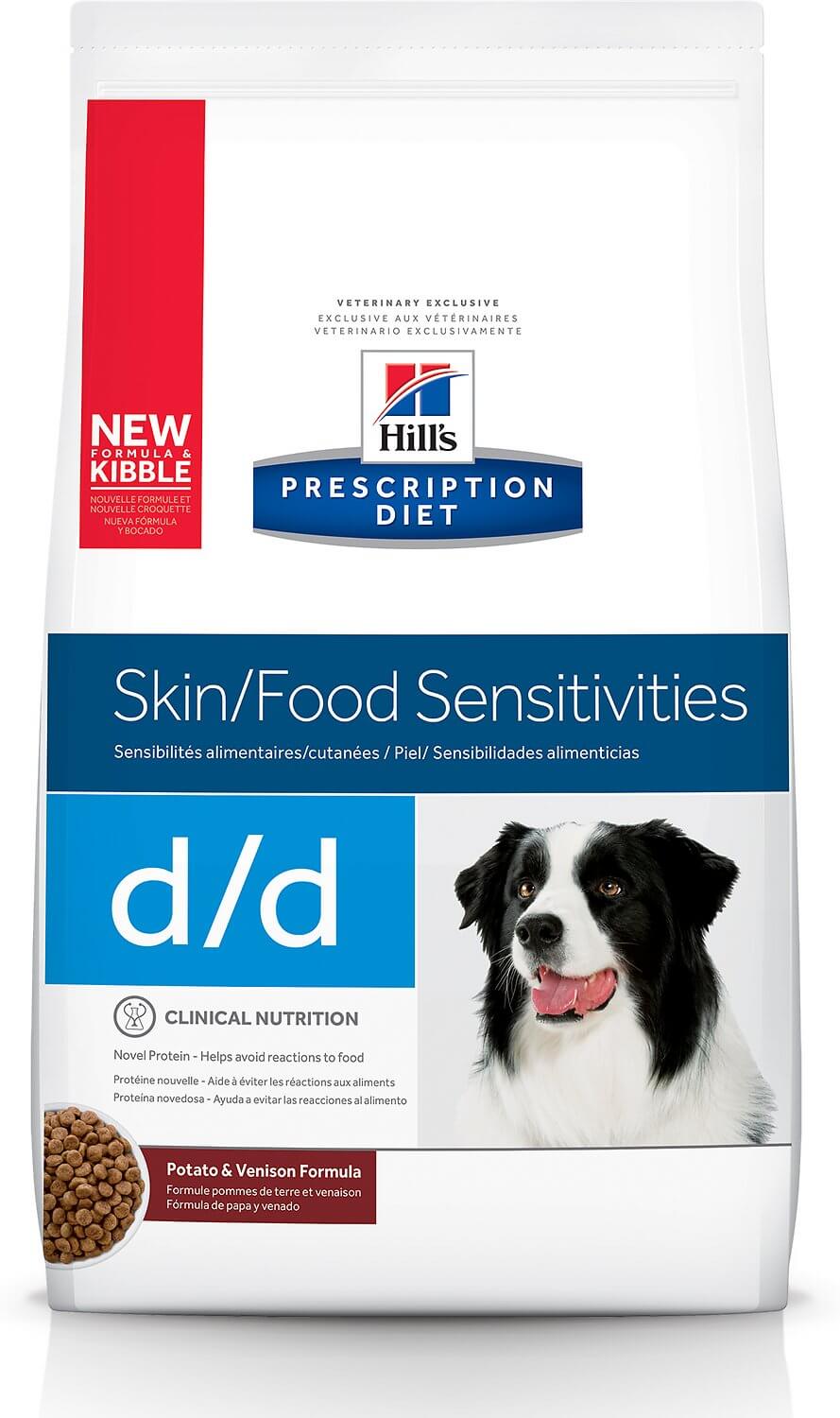Hill’s Prescription Diet D/D Canine Dog Food Review (Dry)

DogFoodAdvisor is reader supported See how
All reviews are 100% impartial but if you buy using links on this page, we may earn a referral fee.
Unrated
Which Hill’s Prescription Diet D/D Canine Recipes Get Our Best Ratings?
Hill’s Prescription Diet D/D Canine Dog Food is not rated due to its intentional therapeutic design.
The Hill’s Prescription Diet D/D Canine product line includes 3 dry dog foods, each designed to help in the treatment of food sensitivities that can cause skin or digestive issues.
Each recipe below includes its AAFCO nutrient profile when available… Growth (puppy), Maintenance (adult), All Life Stages, Supplemental or Unspecified.
| Product | Rating | AAFCO |
|---|---|---|
| Hill’s Prescription Diet D/D Canine Potato and Duck | not rated | M |
| Hill’s Prescription Diet D/D Canine Potato and Salmon | not rated | M |
| Hill’s Prescription Diet D/D Canine Potato and Venison | not rated | M |
Recipe and Label Analysis
Hill’s Prescription Diet D/D Canine Potato and Venison was selected to represent the other products in the line for detailed recipe and nutrient analysis.
Label and nutrient data below are calculated using dry matter basis.
Hill's Prescription Diet D/D Canine Potato and Venison
Estimated Dry Matter Nutrient Content
Protein
Fat
CarbsCarbohydrates
Potatoes, potato starch, venison, potato protein, soybean oil, coconut oil, powdered cellulose, pork liver flavor, dicalcium phosphate, lactic acid, fish oil, potassium chloride, glyceryl monostearate, calcium carbonate, iodized salt, choline chloride, vitamins (vitamin E supplement, l-ascorbyl-2-polyphosphate (source of vitamin C), niacin supplement, thiamine mononitrate, calcium pantothenate, pyridoxine hydrochloride, vitamin A supplement, riboflavin supplement, biotin, vitamin B12 supplement, folic acid, vitamin D3 supplement), dl-methionine, taurine, minerals (ferrous sulfate, zinc oxide, copper sulfate, manganous oxide, calcium iodate, sodium selenite), mixed tocopherols for freshness, magnesium oxide, natural flavors, beta-carotene
Fiber (estimated dry matter content) = 3.3%
Red denotes any controversial items
| Estimated Nutrient Content | |||
|---|---|---|---|
| Method | Protein | Fat | Carbs |
| Guaranteed Analysis | 19% | 16% | NA |
| Dry Matter Basis | 19% | 16% | 58% |
| Calorie Weighted Basis | 16% | 34% | 50% |
Ingredient Analysis
The first ingredient in this dog food is potato. Potatoes can be considered a gluten-free source of digestible carbohydrates. Yet with the exception of perhaps their caloric content, potatoes are of only modest nutritional value to a dog.
The second ingredient is potato starch. Potato starch is a gluten-free carbohydrate of only modest nutritional value to a dog.
The third ingredient is venison. Although it is a quality item, raw venison contains up to 73% water. After cooking, most of that moisture is lost, reducing the meat content to just a fraction of its original weight.
After processing, this item would probably account for a smaller part of the total content of the finished product.
The fourth ingredient is potato protein, the dry residue remaining after removing the starchy part of a potato.
Even though it contains over 80% protein, this ingredient would be expected to have a lower biological value than meat.
And less costly plant-based products like this can notably boost the total protein reported on the label – a factor that must be considered when judging the actual meat content of this dog food.
The fifth ingredient is soybean oil. Soybean oil is high in omega-6 fatty acids and contains no omega-3’s, it’s considered less nutritious than flaxseed oil or a named animal fat.
The next ingredient is coconut oil, a natural oil rich in medium-chain fatty acids.
Medium-chain triglycerides have been shown to improve cognitive function in older dogs.1
Because of its proven safety2 as well as its potential to help in the treatment of canine cognitive dysfunction syndrome (CDS) and chronic skin disorders, MCT can be considered a positive addition to this recipe.
The seventh ingredient is powdered cellulose, a non-digestible plant fiber usually made from the by-products of vegetable processing. Except for the usual benefits of fiber, powdered cellulose provides no nutritional value to a dog.
From here, the list goes on to include a number of other items.
But to be realistic, ingredients located this far down the list (other than nutritional supplements) are not likely to affect the overall rating of this Hill’s product.
With 4 notable exceptions…
First, this recipe includes fish oil, which is naturally rich in the prized EPA and DHA type of omega-3 fatty acids. These two high quality fats boast the highest bio-availability to dogs and humans.
Depending on its level of freshness and purity, fish oil should be considered a commendable addition.
Next, we note the use of taurine, an important amino acid associated with the healthy function of heart muscle. Although taurine is not typically considered essential in canines, some dogs have been shown to be deficient in this critical nutrient.
Since taurine deficiency appears to be more common in pets consuming grain-free diets, we view its presence in this recipe as a positive addition.
In addition, this recipe contains sodium selenite, a controversial form of the mineral selenium. Sodium selenite appears to be nutritionally inferior to the more natural source of selenium found in selenium yeast.
And lastly, the minerals listed here do not appear to be chelated. And that can make them more difficult to absorb. Chelated minerals are usually associated with higher quality dog foods.
Nutrient Analysis
Although this is a prescription product, our review has nothing to do with the accuracy of claims made by the manufacturer as to the product’s ability to treat or cure a specific health condition.
So, to find out whether or not this Hill’s dog food is appropriate for your particular pet, it’s important to consult your veterinarian.
With that understanding…
Based on its ingredients alone, Hill’s Prescription Diet D/D Canine appears to be an average dry product.
The dashboard displays a dry matter protein reading of 19%, a fat level of 16% and estimated carbohydrates of about 58%.
As a group, the brand features an average protein content of 19% and a mean fat level of 16%. Together, these figures suggest a carbohydrate content of 58% for the overall product line.
And a fat-to-protein ratio of about 86%.
Which means this Hill’s product line contains…
Below-average protein. Near-average fat. And above-average carbs when compared to a typical dry dog food.
When you consider the protein-boosting effect of the potato protein, this looks like the profile of a kibble containing a limited amount of meat.
Our Rating of Hill’s Prescription Diet D/D Dog Food
Hill’s Prescription Diet D/D Canine is a limited ingredient dry dog food using a limited amount of named meats as its main source of animal protein.
Hill’s Prescription Diet Canine Food Recall History
The following automated list (if present) includes all dog food recalls related to Hill’s through July.
- Hill’s Prescription Diet and Science Diet Dog Food Recall Expands to Include 44 Varieties (3/20/2019)
- Hill’s Prescription Diet and Science Diet Dog Food Recall (1/31/2019)
- Hill’s Science Diet Dog Food Market Withdrawal of November 2015 (11/29/2015)
- Hill’s Science Diet Dog Food Recall June 2014 (6/3/2014)
You can view a complete list of all dog food recalls since 2009 here.
Get Free Recall Alerts
Get free dog food recall alerts sent to you by email. Subscribe to The Advisor’s recall notification list.
More Hill’s Brand Reviews
The following Hill’s dog food reviews are also posted on this website:
- Hill’s Healthy Advantage Dog Food Review (Dry)
- Hill’s Prescription Diet Weight Loss R/D Canine Dog Food Review (Dry)
- Hill’s Prescription Diet Z/D Canine Dog Food Review (Canned)
- Hill’s Science Diet Adult Dog Food Review (Canned)
- Hill’s Science Diet Adult Dog Food Review (Dry)
- Hill’s Science Diet Adult Perfect Weight Dog Food Review (Canned)
- Hill’s Science Diet Adult Perfect Weight Dog Food Review (Dry)
- Hill’s Science Diet Adult Plus Dog Food Review (Dry)
- Hill’s Science Diet Grain Free Dog Food Review (Dry)
- Hill’s Science Diet Healthy Cuisine Dog Food Review (Canned)
- Hill’s Science Diet Puppy Food Review (Canned)
Compare This Dog Food
How does this brand compare with The Dog Food Advisor's most recommended brands?
Sources
A Final Word
The Dog Food Advisor does not accept money, gifts, samples or other incentives in exchange for special consideration in preparing our reviews.
However, we do receive a referral fee from online retailers (like Chewy or Amazon) and from sellers of perishable pet food when readers click over to their websites from ours. This helps cover the cost of operation of our free blog. Thanks for your support.
For more information, please visit our Disclaimer and Disclosure page.






